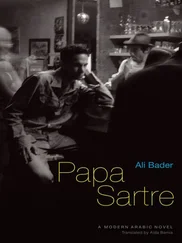The conductor stood there with his thick coat and wine-red face. ‘Where are you from?’ he asked.
‘From Iraq,’ answered Yousef, his palms sweating.
‘Good,’ he said, ‘try to find a scene from your country and your people to turn into music.’
The conductor gave him this piece of advice without really knowing where Iraq was located on the map. After his return from Moscow, Yousef consoled himself with the thought that he would compose a piece of music inspired by local sights: the loud calls of the radish-seller, whose voice filled the lane; the coachman who drove his carriage through the streets, tooting his horn; the sight of Hamadi, the peddler, who walked with his stubborn, scabby mule tied to a colourfully decorated cart, carrying turnips from Sayed Hassan’s farm; the music of a Kurdish beggarwoman singing in a melodious voice, imploring people to give her crusts of dry bread that she could sell in bulk to the bran-sellers. Or he might find inspiration in his love for his cousin Gladys, in the pleasure of eating kebab with Persian-made silver cutlery at home, or in the sight of his beloved Gladys sitting on the sofa and reading the Holy Book.
That day, when he got up from his seat, he felt that he had hit on an idea. The Russian conductor’s advice might well be applied to Gladys’s image, the indescribable joy he felt on accompanying his mother on her visits to his aunt Massouda Dalal in Al-Karradah and eating kebab, while his sisters Daisy, Rachel and Saida stayed at home. At his aunt’s house, he would hear the grownups discussing grave and important matters for the very first time. It was there that he first heard names that never entirely disappeared from his life: Hitler, Mussolini, Nazism, the Axis, the Allies, the Boy Scouts and the Youth Brigades.
His cousin Gladys sat beside him and together they read the Holy Book. With her beautiful hands she lifted a jug that stood on the table, allowing him to see her smooth, white armpits. Their lovely fragrance made him feel intoxicated and entranced. He looked at her face that was encircled by a halo of henna-coloured hair, at the breathtaking beauty that never left his mind, even in his dreams. He looked at this girl who was prettier and more graceful than any other girl in the community, as well as being the most unassailable, even though she liked him and was friendly enough to him. Her full lips parted in a pleasing smile as she placed her hand on his shoulder.
She had once taken him and sat him on the red-brick wall of the house, where they’d been surrounded by a vast expanse of green grass. Then she had led him by the hand to a spot beneath a palm tree. They had stood and looked up at the thick bunches of dates beneath the branches that swayed in the breeze. As he watched the hens pecking and picking the grains from beneath the palms and around the red-brick wall he was blissfully happy. Gladys was wearing her gossamer white dress. Her arms were bare and her neck was like a swan’s. That evening she had let him enter the house where she had hung the tebit lamp in celebration of the Jewish New Year. On the table, she had placed a chicken stuffed with spices, chickpeas and meat.
Yousef was surprised when Gladys put down the Holy Book and picked up her favourite book, the French Syllabaire that she had studied at the Alliance School. She ran off, singing a beautiful song with a sweet voice and a lively rhythm as she picked up the fallen dates. Listening to the French lyrics flowing so smoothly from her lips, Yousef felt assaulted by the ruthless, incomprehensible foreign words that hurt his ears like the cries of huge birds of prey. It was at that time that Yousef discovered the wild roses that bloomed in a little mud pond near the brick wall and the flowers that blossomed in the spring in the lovely, small garden. When the family were away visiting any of the synagogues nearby, such as Abu Saleh, Massouda Shemtov or Sami Twaiq, Gladys would sit beside him, reading to him from the Syllabaire , while together they looked at the old tree, its bark covered with lichen.
Yousef realized that he was the only male that his cousin paid attention to. One day she took him into a little room in the yard and lay with him on a rusty iron bed. The bed had been abandoned in a room on the upper floor, but her mother had brought it down in the hope that Bahiza, the daughter of the Muslim farmers who owned a pen and two cows near the grove, might come to work for them and sleep in it.
Gladys dragged shy Yousef by the hand, undressed him and made him lie down on the bed. She started to fondle him. When she asked him to suck her nipples, he obeyed. With his quivering lips, he began to suck the ardent, rosy nipples. He looked with expectation at the passion in her sparkling eyes. He heard the huskiness of her voice and saw the redness of her cheeks. The scent of her clean, white clothes was irresistible. There on the bed he could smell her arousal, as she breathed in the masculine charm that was impossible for an adolescent girl to resist. She drew him to her with with one arm and extended the other beneath her knickers until delirium overcame her whole body and she began to tremble as she hugged and kissed him. When she gasped, he was terrified that she might be in pain or dying.
This was the first time Yousef had experienced moments of intimacy, and been alone with a woman. It was not an easy experience at all. It was the first time he had actually seen a woman’s breasts, white as coffee cups. It was the first time his lips had touched a real, rosy nipple after years and years of imagining it. He feared it might dissolve between his lips. For days afterwards, he had a devastating headache and his whole being was in a state of turmoil. His body throbbed and his mind wandered. He felt a similar kind of throbbing when his first long Mozart piece was aired on the radio. The presenter described him as the most gifted violinist in the country, the first to excel in classical music. This last description remained with him as an inspiration. It might even have erased the memory of his trembling, throbbing body, his headache and his obsession with the young Gladys. But how?
It was not, in fact, easy for Yousef to forget those moments, which distracted him for days on end. When he met Gladys days after the event, he was taken aback that she behaved so normally. He tried to avoid her gaze whenever her eyes happened to meet his. In contrast, she paid little attention to the whole thing and behaved quite naturally, as though nothing had ever happened between them. For his part, he kept repeating the radio presenter’s words in his head in order to erase the memory of this experience and to relieve the pangs of conscience that began to torture him. He hoped that the presenter’s words might wipe the scene from his mind. It was a strange scene that attracted and repelled him at the same time. Not a day passed without him dreaming about it or losing sleep because of it. It deprived him of the beauty of solitude and of clear thinking and meditation. The reason was that as a romantic he believed that sex was far more sublime than this image of animal passion. Sex was like music, with its variations, crescendos and mystic sublimation. It was not smells, secretions, gasps, or shameful moaning. It was a kind of soaring upwards, not bodies lying prostrate or lips shouting, ‘Suck! Suck!’ Gladys’s angelic face at home was the exact opposite of her image during those intimate moments: her dishevelled hair, red eyes, sweaty face, trembling lips and hoarse, moaning voice.
So every time he remembered the erotic gasps and moans, he repeated to himself the words of the radio presenter, although he was not sure if the man even knew the meaning of classical music. The man’s words seemed to him to contrast with the Russian conductor’s advice to him to return to his native roots for inspiration.
Читать дальше












